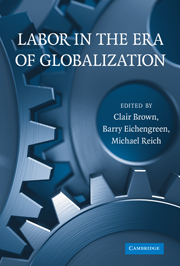'The essays in this volume drill down below the surface to provide rich explanations for three decades of stagnant wages, rising inequality, and increasing income insecurity. Without ignoring the effects of globalization, immigration, deregulation, and weakening of employment protection, the authors introduce important new analyses that incorporate variously institutions and cultural norms or examine less-studied linkages such as the impact of financial deregulation on labor markets. This is an important book with fresh insights into the causes and consequences of these developments.'
Eileen Appelbaum - Rutgers University
'Bringing together a stellar set of economists and political scientists, this collection weaves economic arguments together with a nuanced analysis of institutions and political choices to explain the unraveling of labor’s gains since the mid-twentieth century. For anyone trying to understand, or do something about, the losses in income and security suffered by working people over the course of the last four decades, it will be an invaluable resource.'
Peter Evans - University of California, Berkeley
'Labor in the Era of Globalization is an awesome mix of political economy and institutional labor economics that shows that institutions – from unions to political structures and from financial institutions to the family and to labor laws – are important determinants of economic outcomes. The book is filled with fascinating, insightful, and occasionally irritating analyses that have more to say about the macro- and microeconomics of labor than the past two to three decades of laissez-faire theorizing. The only thing missing is a health warning on the jacket: Right-wing ideologues, true believers in perfect markets, beware: reading can cause an apoplectic fit, clenched fists, or a primal scream.'
Richard Freeman - Harvard University and NBER
'The uniqueness of this volume is that its research focus goes beyond the standard labor market approach of examining comparative advantages across countries as a key source of international differences of earnings, employment, and job security. In contrast, Labor in the Era of Globalization’s emphasis on institutional arrangements provides a nuanced approach that allows for greater understanding of the differing labor market challenges that workers face in Europe, Asia, and the United States. Its topical coverage coupled with a dispassionate approach toward analysis suggests that this volume will generate great interest from practitioners in business, academia, labor, and government.'
James Peoples - University of Wisconsin–Milwaukee



